 Petzlover
Petzlover Oriental Bicolour is originated from United States but Manx is originated from United Kingdom. Both Oriental Bicolour and Manx are having almost same weight. Both Oriental Bicolour and Manx has same life span. Both Oriental Bicolour and Manx has same litter size. Both Oriental Bicolour and Manx requires Low Maintenance.
Oriental Bicolour is originated from United States but Manx is originated from United Kingdom. Both Oriental Bicolour and Manx are having almost same weight. Both Oriental Bicolour and Manx has same life span. Both Oriental Bicolour and Manx has same litter size. Both Oriental Bicolour and Manx requires Low Maintenance.
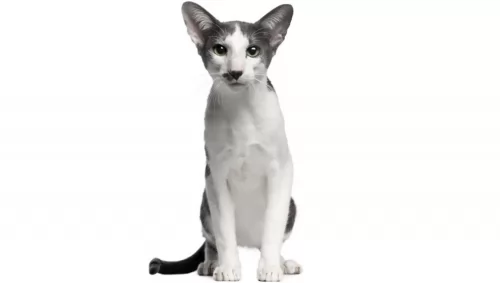 Oriental Bicolour cats owe their origins to Lindajean Grillo of Ciara Cattery. The cats hail from the United States. It was in 1979 that Grillo paired a Siamese and bicolored American Shorthair, selecting the best bicolored offspring to mate again with Siamese or Orientals.
Oriental Bicolour cats owe their origins to Lindajean Grillo of Ciara Cattery. The cats hail from the United States. It was in 1979 that Grillo paired a Siamese and bicolored American Shorthair, selecting the best bicolored offspring to mate again with Siamese or Orientals.
This particular variety was granted recognition in 1983 by TICA. It was during the 1980s that European breeders started their own Oriental bicolor breeding lines. The first modern Oriental Bicolours were imported to the UK during 2004.
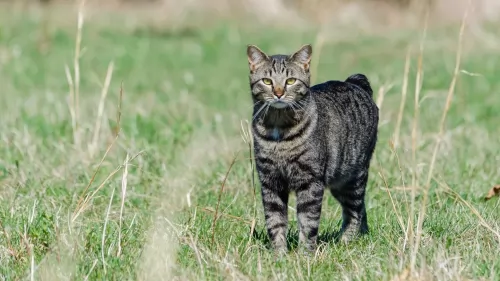 The Manx cat is a domestic cat originating on the Isle of Man, with a short tail. It is one of the oldest cat breeds.
The Manx cat is a domestic cat originating on the Isle of Man, with a short tail. It is one of the oldest cat breeds.
The cat is actually known as being a tailless cat. This is the cat's most distinguishing feature. They've been seen at cat shows since the 1800s.
These cats are descended from mainland stock, whose origins are unknown. It is said these cats are descended from the African wildcat.
The Manx is recognized by the Cat Fanciers Association as well as other cat associations.
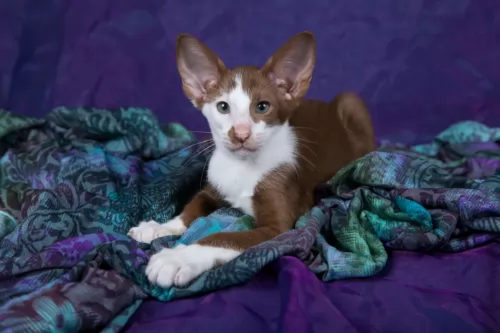 These cats with a triangular-shaped head and slender, long body have a fairly thin tail. The ears are widely set and are large. The eyes are green, but blue with the colorpoint varieties.
These cats with a triangular-shaped head and slender, long body have a fairly thin tail. The ears are widely set and are large. The eyes are green, but blue with the colorpoint varieties.
The coat is short, close-lying and sleek while the coat of the long-haired variety is fine and silky with no thick undercoat. The tail forms a plume. The coat is mostly white and the other part of the coat can be in any other color. You’ll always see quite a bit of white around the legs.
These cats are suited for singles, couples, families, and seniors - in fact, anyone still active enough to provide this cat with lots of attention.
These vibrant cats are known for their social, friendly and loving personality. They are intelligent, inquisitive, active cats that need to have plenty of interaction with their human family members. They love their human family and love to hold conversations with them.
They're entertaining too, and love nothing more to ve the center of attention. They're so into their human family that you may even have him waiting patiently for you to come home fro work. He shouldn't be left alone for hours on end and should rather have a pet friend to keep him company during the day.
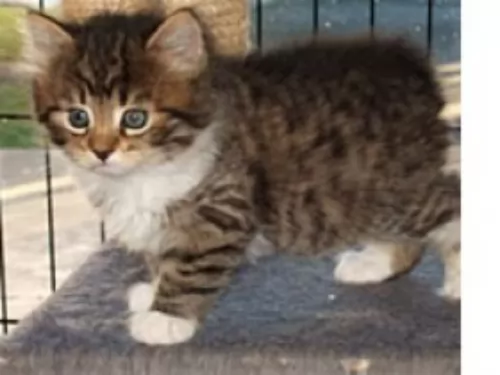 The Manx cat is a medium-sized cat with a stocky, muscular, heavy build. He can weigh between 3 and 6kg. Manx cats come in all coat colors and patterns.
The Manx cat is a medium-sized cat with a stocky, muscular, heavy build. He can weigh between 3 and 6kg. Manx cats come in all coat colors and patterns.
The coat of the cat can be short or long. The long-haired variety is considered its own breed. The cat has always been popular for helping farmers keep rodents under control.
Besides taillessness, the Manx is described as a round cat and its head is round too. The back legs of the cat are much longer than the forelegs.
The eyes of this cat are large and round and can be in different colors such as green, gold, copper, brown, or yellow.
They are very playful and intelligent cats who are devoted to their families. They can easily learn tricks and he can even be taught to walk on a leash.
They’re cats that love to jump and they’re active, playful cats. Don’t be surprised if you see him playing with the water in his water bowl as he is a cat fond of playing in water.
These cats are thought to be dog-like as they’re capable of becoming devoted to their human family. They also have a great sense of humor and they become very entertaining. Children love them as they’re so playful and they in turn get on well with children. When you have a Manx cat in your house, there is never a dull moment.
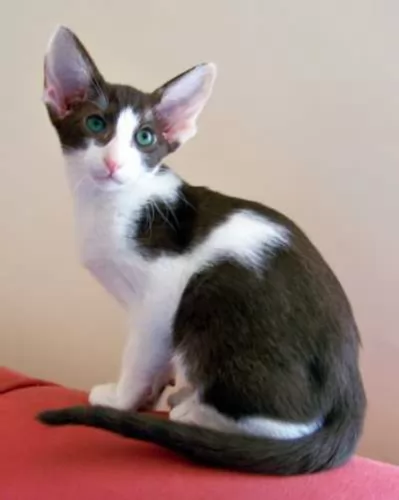 The Oriental Bicolor is such a wonderful pet to have. They are intelligent, entertaining, loving, active, playful, and inquisitive.
The Oriental Bicolor is such a wonderful pet to have. They are intelligent, entertaining, loving, active, playful, and inquisitive.
They’re also athletic and energetic. These cats have got all the characteristics you want in a good friend. They make a fantastic companion to people who are active and happy. They’re also very vocal and have a lot to say to their human family.
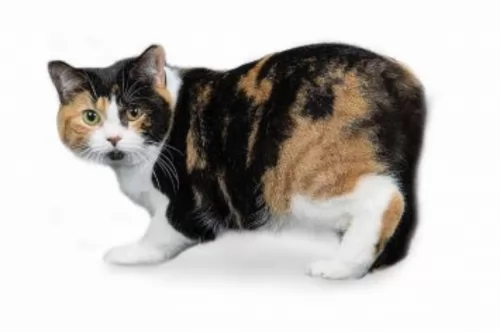 The loving Manx cat is such an even-tempered cat as well and wants to get along well with its entire human family. You can be sure of many years of affection and companionship from this cat.
The loving Manx cat is such an even-tempered cat as well and wants to get along well with its entire human family. You can be sure of many years of affection and companionship from this cat.
It’s a cat that is fairly placid but it still loves to run and play, It’s an amusing cat too and to round everything off it also has a strange way of walking and running.
Give the Manx cat a warm. Loving home and you’ll quickly discover why the Manx cat is such a popular companion cat for so many people. The Manx is such a social, family orientated cat and you shouldn't bring him into your home if you don't have plenty of time for him.
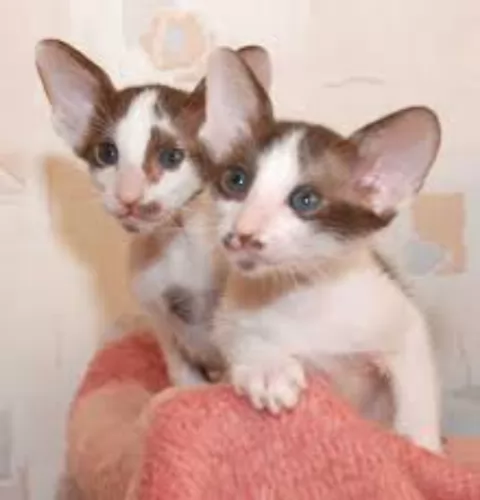 Any cat can develop health problems. Even kittens that come with a certificate of health can develop illnesses that you never thought possible.
Any cat can develop health problems. Even kittens that come with a certificate of health can develop illnesses that you never thought possible.
Orientals are generally healthy cats, but the health issues that may affect the Oriental are similar to that of the Siamese cat.
One of these is Progressive Retinal Atrophy (PRA). This is a genetic eye problem that can lead to blindness. Another disease to look out for is Asthma. The Siamese is susceptible to this disease which means your Oriental Bicolor will also be. You will have to get your furry friend to the vet who may precribe anti-inflammatory drugs.
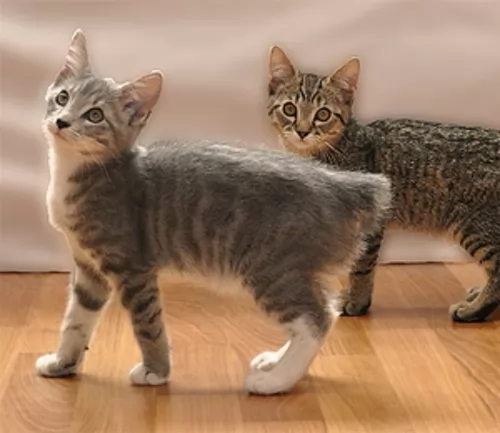 The absence of a tail with the Manx cat is believed to be a genetic defect and because of the spine that looks deformed, it is thought that this would cause the cat problems.
The absence of a tail with the Manx cat is believed to be a genetic defect and because of the spine that looks deformed, it is thought that this would cause the cat problems.
Arthritis can set in early with the Manx cat. Arthritis or osteoarthritis affects many cats and the signs of arthritis in a cat can actually be subtle. The disease can go undetected. Arthritis is about wear and tear in the joints, although other factors such as injury, infection and genetic makeup come into play as well. Arthritis can affect one or more joints in the body such as the hips, elbows ad spine.
The mutant gene that causes the taillessness in this cat may also be responsible for other skeletal deformities in the Manx cat. As a round-shaped cat, the Manx cat can also battle with bladder control.
These ailments are just possibilities with this cat breed and it is more than likely that your Manx cat will never have any one of these diseases.
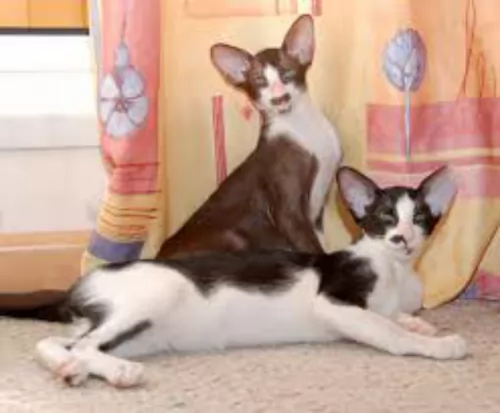 The Oriental Bicolor will require a brushing once a week. A good idea is to also take a warm, damp cloth and to wipe your cat down. It’s an excellent way to rid your cat of loose hairs as well as dust. The cat has a sparse coat, so brush him gently.
The Oriental Bicolor will require a brushing once a week. A good idea is to also take a warm, damp cloth and to wipe your cat down. It’s an excellent way to rid your cat of loose hairs as well as dust. The cat has a sparse coat, so brush him gently.
Other grooming requires nail clipping and checking inside his ears. If you clean his ears, be careful not to go deep into the ear. It is precisely why so many cat owners take their cat to the pet groomers where they can do these things professionally.
It’s very important to keep your Bicolor’s litter box spotlessly clean because like most cats, they won’t use their litterbox if it’s still got yesterday’s feces in it. It needs to be cleaned every day.
The Oriental’s diet is much like that of other cats – it has to be meaty. You can’t afford to not understand your feline pet’s dietary needs. Cats are carnivorous and they need commercial cat food that will be equal to fresh meat that they would normally find in the wild.
They need foods high in protein but they will still need some carbohydrates, amino acids, and vitamins, and minerals. Always go for the best quality pet cat foods because by buying the poorer quality ones you put your cat at risk of developing health problems. Never ever leave your cat without a constant supply of fresh, cool drinking water.
Supply your cat with all the things that make it a pleasure to have a cat. You don’t want to bring your pet home and only then start looking for things to make him at home. He’ll need food and water bowls, a nice warm, soft bed, a litter box, grooming accessories, collar, toys climbing tree and scratching pole.
Have your pet neutered or spayed to prevent unwanted kittens.
Make sure he is taken to the vet when ill. You shouldn't own a pet if you can't afford to pay vet fees. There are some cat illnesses that can make your cat very sick and uncomfortable. He should have his vaccines and also be treated for parasites.
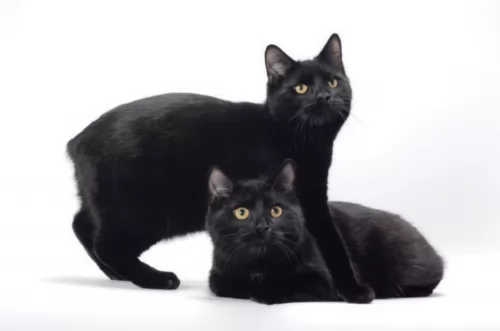 One of the most important caring things that you can do for your cat is to provide him with the best diet there is. The Manx cat requires a balanced diet of protein, vitamins and minerals.
One of the most important caring things that you can do for your cat is to provide him with the best diet there is. The Manx cat requires a balanced diet of protein, vitamins and minerals.
The Manx cat is a carnivore and will need a diet high in protein. Learn to read the labels on the packaging of the commercial cat food, whether wet or dry, and ensure that ingredients such as omega 3 fatty acids and taurine are in the ingredients list.
If you are in any doubt as to what to feed your Manx cat, speak to your vet.
The short coat of the Manx is easily cared for by a brush each week to remove dead, loose hair.
With this tailless cat, you need to check the rear end and perhaps clip the hair short in this area to ensure no feces clinging to the fur surrounding the anus.